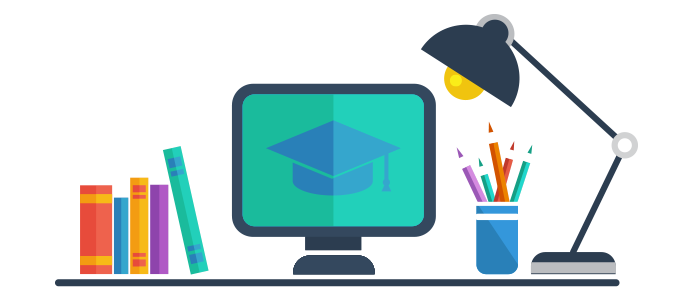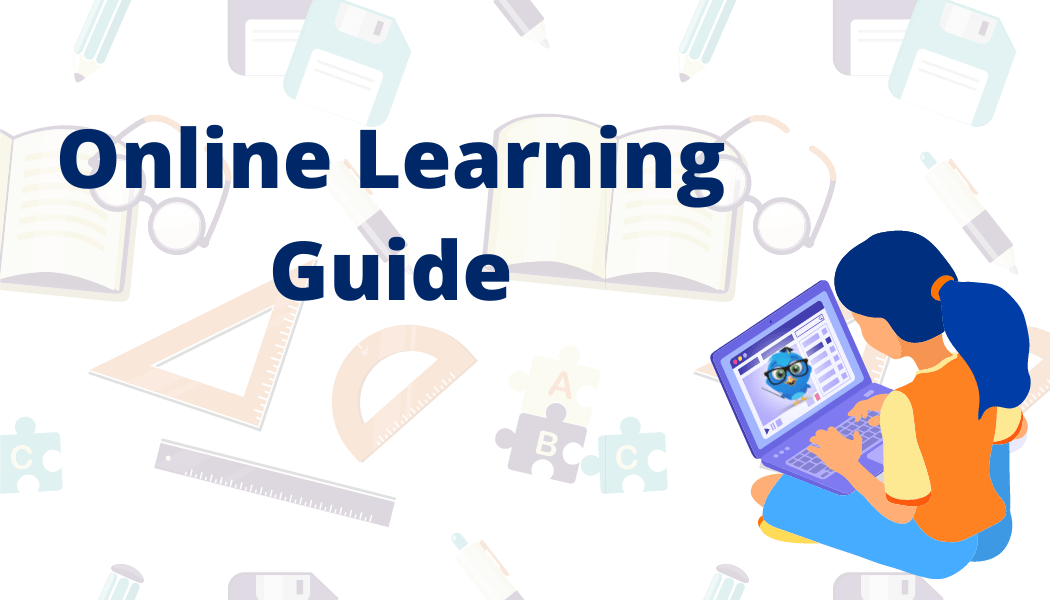Online learning offers flexibility and a variety of courses to suit individual needs. It’s an effective way to gain knowledge and skills remotely.
Embracing the digital revolution, online learning has become a cornerstone of education in our technology-driven world. It allows learners to study at their own pace, often at a lower cost than traditional classroom settings. This learning mode caters to a wide audience, from students to professionals seeking career advancement.
With its accessibility, online courses have opened doors to endless possibilities and learning experiences that transcend geographical boundaries. As you embark on your online education journey, understanding how to navigate the digital classroom, manage your time, and engage with course materials is essential for success. This guide will equip you with the strategies and tools needed to thrive in the virtual learning environment. [Online Learning Guide.]

Credit: www.uni-prep.com
Embracing The Digital Shift In Education
The digital wave has transformed the way we learn. Classrooms now extend beyond four walls. This change brings a whole new world of possibilities. Let’s dive into how e-learning platforms are reshaping education.
The Rise Of E-learning Platforms
E-learning platforms are booming. They offer courses from math to art. You can learn anything, anytime, anywhere. These platforms make education flexible and accessible.
- Convenience: Learn in your pajamas
- Variety: Pick from thousands of courses
- Community: Study with people across the globe
Benefits Of Learning Online
Online learning isn’t just convenient; it’s effective. Here’s why:
| Benefit | Details |
|---|---|
| Flexibility | Study on your schedule |
| Cost-Effective | Save on travel and materials |
| Personalized Pace | Take your time to understand |
With online learning, you’re in control. Advance your skills or explore new hobbies. The choice is yours, and the time is now. [Online Learning Guide.]
Setting Up For Success
Online learning requires a dedicated approach to truly excel. Creating the right environment and having the necessary tools can transform your educational experience. Let’s dive into how you can set up a successful learning space.
Creating A Conducive Learning Environment
To succeed in online learning, a well-organized space is key. This area should be quiet, comfortable, and free from distractions. Here’s how to achieve that:
- Choose a quiet spot: Avoid areas with high foot traffic.
- Ensure good lighting: Natural light is best, but soft artificial light works too.
- Keep it organized: Have a clean desk with only necessary items.
- Limit distractions: Keep mobile devices away unless needed for learning.
Essential Tools And Technologies
The right tools can make learning effective and fun. Here are the essentials:
| Tool | Use |
|---|---|
| Computer or Tablet | Access courses and resources |
| High-Speed Internet | Stream videos without buffering |
| Learning Management System (LMS) | Track progress and submit assignments |
| Headphones | Listen to lectures without disturbances |
Alongside these, software tools such as PDF readers, note-taking apps, and cloud storage are invaluable for managing study materials and notes efficiently.
Choosing The Right Online Courses
Embarking on online education can be exciting. Yet, it can be daunting. The key is to pick courses that match your goals. This guide will help you navigate through the options.
Identifying Your Learning Objectives
Before you start, know what you want to achieve. Are you looking to gain a new skill? Or maybe you want to advance in your career? Your goals shape the courses you should consider.
- Personal enrichment: Choose topics that interest you.
- Career advancement: Look for courses related to your job.
- Academic credit: Ensure the courses offer valid credentials.
Evaluating Course Credibility And Quality
Not all courses are created equal. Quality matters. Here’s how you can assess it:
| Criteria | What to Look For |
|---|---|
| Instructor Expertise | Check the teacher’s background and experience. |
| Course Reviews | Read what past students say about the course. |
| Accreditation | Verify if recognized institutions accredit the course. |
| Curriculum | Ensure the content is up-to-date and comprehensive. |
Effective Time Management Strategies
Mastering time management can transform your online learning experience. It helps balance studies, work, and life. Let’s explore strategies to manage time effectively.
Designing a Study Schedule
Designing A Study Schedule
Creating a study schedule is a cornerstone of success in online learning. It provides structure and keeps you focused.
- Identify your peak productivity times: Schedule challenging subjects when you’re most alert.
- Set specific goals for each session: Know what you want to achieve before you start.
- Include breaks: Short pauses can boost focus and retention.
Use digital calendars or planners to track your progress and adjust as needed.
Avoiding Procrastination
Avoiding Procrastination
Procrastination is a common challenge. Combat it with practical steps.
| Strategy | How It Helps |
|---|---|
| Set clear deadlines | Creates a sense of urgency |
| Break tasks into smaller steps | Makes large tasks manageable |
| Use a timer | Limits time spent on one activity |
| Reward yourself | Motivates to complete tasks |
Remember, starting is often the hardest part. Begin with easy tasks to gain momentum.
Interactive Learning Techniques
Online learning opens doors to a world of interactive education. It’s not just about reading texts. It’s about engaging with content and people. This section dives into techniques that make learning active and fun. Let’s explore how virtual classrooms and online communities can transform your learning experience. [Online Learning Guide.]
Participating In Virtual Classrooms
Virtual classrooms bring the live classroom experience to your screen. Here’s how you can make the most of them:
- Engage with live polls to share your opinion.
- Use raise hand features to ask questions.
- Join breakout rooms for group work.
- Take part in real-time quizzes to test your knowledge.
These tools make learning dynamic and keep you connected with your peers and instructors.
Leveraging Online Forums And Communities
Online forums and communities are treasure troves of knowledge. Here’s how you can use them:
- Post questions and get answers from experts.
- Share resources and gain new perspectives.
- Join discussions to deepen your understanding.
- Create study groups for collaborative learning.
These platforms offer a space to discuss ideas, solve problems, and build knowledge with others from around the globe. [Online Learning Guide.]
Mastering Self-discipline And Focus
Embarking on an online course is exciting! Yet, it requires a strong will and sharp focus. Success in online learning demands self-discipline and the ability to keep distractions at bay. Let’s dive into strategies for maintaining motivation and minimizing disruptions.
Staying Motivated Throughout The Course
Setting clear goals is key. Break them into small, achievable tasks. This makes progress easy to track. Celebrate each milestone, no matter how small. Rewards keep spirits high and motivation strong.
- Set daily or weekly goals
- Use a planner to track progress
- Reward yourself after completing tasks
Joining online study groups can also boost motivation. Engage in forums or chat groups related to the course. It’s helpful to share challenges and successes with peers.
Minimizing Distractions And Interruptions
Create a dedicated study space where focus comes naturally. Make sure it’s tidy and comfortable. Inform family and friends of your study schedule to prevent interruptions. Use tools like website blockers to keep online distractions away. [Online Learning Guide.]
| Tool | Function |
|---|---|
| Focus apps | Limits time on social media |
| Do Not Disturb mode | Silences notifications |
| Timers | Keeps sessions focused |
Remember, frequent breaks are essential. They prevent burnout and keep your mind fresh. Use techniques like the Pomodoro Technique for structured work and rest periods.
Maximizing Online Resources
Welcome to our comprehensive Online Learning Guide. In this section, we dive into Maximizing Online Resources. The digital world offers a treasure trove of educational materials. Learners of all ages can enhance their knowledge and skills with the right tools. Let’s explore how to make the most of these resources.
Utilizing Multimedia Materials
Multimedia materials can transform your learning experience. These resources include videos, audio files, and interactive simulations. They cater to different learning styles and can help clarify complex concepts. Below, find ways to incorporate multimedia into your studies:
- Search for educational YouTube channels related to your subject.
- Listen to podcasts from experts for deeper insights.
- Engage with interactive quizzes and games to test your knowledge.
Remember to use reputable sources to ensure quality learning.
Exploring Additional Learning Tools
Beyond multimedia, countless online learning tools can aid your education. These tools offer unique ways to learn and practice new skills. Here’s a list of tools to consider:
| Tool Type | Description | Examples |
|---|---|---|
| Educational Platforms | Course-based learning on a variety of topics | Khan Academy, Coursera |
| Flashcard Apps | Spaced repetition for memorizing facts | Anki, Quizlet |
| Study Groups | Collaborative learning communities | StudyBlue, Google Groups |
Combine these tools with your coursework for a well-rounded education.

Credit: www.devlinpeck.com
Assessing And Certifying Your Skills
Mastering new skills is exciting. Showing them off is even better. Assessing and Certifying Your Skills is crucial. It lets you prove your abilities. It can help in career growth. This part of the guide shows how to do it online.
Taking Online Exams And Quizzes
Online exams measure your knowledge. They are like traditional tests but on the internet. They can be timed. They may have different question types. Examples include:
- Multiple choice: Pick the right answer from the options.
- True or False: Say if a statement is right or wrong.
- Essay questions: Write detailed answers.
Here’s how to prepare for online exams:
- Find a quiet place.
- Check your tech. Make sure your computer and internet work well.
- Understand the rules. Know what is allowed.
- Practice with sample tests if available.
Quizzes are shorter tests. They help you see how well you understand a topic. You can often take them many times. This helps you learn better.
Earning Certificates And Credentials
Online learning can lead to certificates. These show you completed a course. They add value to your resume. Some platforms offer them, like:
| Platform | Type of Certificate |
|---|---|
| Coursera | Professional Certificates |
| edX | MicroMasters |
| Udemy | Certificates of Completion |
Some tips for earning online certificates:
- Choose courses that offer certificates.
- Complete all tasks and exams.
- Pay any required fees for the certificate.
Credentials are like digital badges. They prove your skills. Some jobs may require them. You can share them on LinkedIn or your CV.
Networking And Collaboration Online
In the realm of online education, networking, and collaboration play pivotal roles. These elements bridge the gap between virtual learning and real-world connections. They enrich the learning experience by fostering interaction and teamwork. Here’s how students can maximize their networking and collaboration online:
Connecting With Peers And Mentors
Online platforms offer various tools to connect with peers and mentors. Social media groups, forums, and virtual classrooms allow students to meet others. They share interests and goals. These connections can lead to:
- Knowledge exchange: Learn new concepts from peers and experts.
- Guidance: Receive advice on academic and career challenges.
- Long-term relationships: Build networks that can support future opportunities.
Students should actively participate in discussions and reach out to experienced individuals in their field. This proactive approach helps build a robust professional network online.
Engaging In Group Projects And Discussions
Group projects and discussions are integral to online learning. They simulate a real-world environment where teamwork and communication are essential. Benefits include:
- Improved communication skills: Enhance your ability to express ideas clearly.
- Problem-solving abilities: Tackle challenges collaboratively.
- Project management experience: Learn to organize and manage tasks with a team.
Students should use digital tools like video conferencing and shared documents to collaborate effectively. Participating actively in these projects prepares them for professional teamwork settings.
| Activity | Tools | Benefits |
|---|---|---|
| Online Meetings | Zoom, Skype | Real-time interaction |
| Project Collaboration | Google Docs, Trello | Task management |
| Discussion Forums | Slack, Discord | Continuous learning |
Engage in these activities to enhance your online educational experience. They provide practical skills and real-world applications.

Credit: www.publicservicedegrees.org
Continuous Learning And Skill Development
Continuous Learning and Skill Development form the backbone of professional growth in today’s fast-paced world. Embracing a culture of perpetual learning helps not only to enhance current skills but also to acquire new ones. It prepares individuals for future challenges and opportunities. Let’s explore how to stay relevant and plan in the realm of online education.
Staying Updated With Emerging Trends
The digital landscape evolves at an astonishing rate. Staying informed about the latest trends is crucial. It ensures that your skills remain in demand. Here are strategies to keep you at the forefront of your field:
- Subscribe to industry newsletters and blogs.
- Join online forums and professional networks.
- Attend webinars and virtual conferences.
- Enroll in online courses that focus on new technologies.
Planning For Future Learning Endeavors
Mapping out your learning journey sets the stage for success. It helps you reach your career goals. Here are steps to create a learning plan tailored for the future:
- Identify the skills you need for your dream job.
- Research courses that offer these skills.
- Set realistic timelines for completing each course.
- Allocate time weekly for online studies.
| Skill | Course | Completion Time |
|---|---|---|
| Web Development | Intro to HTML & CSS | 1 Month |
| Data Analysis | Data Science 101 | 2 Months |
Frequently Asked Questions
What Is The Best Way To Learn Online?
The best way to learn online involves choosing reputable platforms, setting clear goals, maintaining consistent study schedules, engaging in active learning, and utilizing interactive resources.
How Do I Get Started With Online Learning?
To start with online learning, choose a reputable platform that offers courses in your area of interest. Sign up, set clear learning goals, and organize a dedicated study schedule. Equip yourself with the necessary tools like a reliable internet connection and a good computer.
Engage actively in all course activities.
How Can I Teach My Online Course?
To teach your online course, choose a platform like Udemy or Teachable. Create engaging content, record high-quality videos, and structure your curriculum effectively. Promote your course through social media and email marketing. Engage with students for feedback and continuous improvement.
Which Is The Best Online Learning?
The best online learning platform varies by individual needs, with Coursera with Coursera, Udemy, and Khan Academy being popular choices for their diverse course offerings and flexible learning environments.
Conclusion
Embracing online education opens doors to a world of knowledge from the comfort of home. It’s vital to choose the right platform and stay disciplined. As we navigate these digital halls of learning, success hinges on our commitment. Keep exploring, stay curious, and let the journey of online learning enrich your life.

I’m based in the USA, Canada, Australia, and the UK—four vibrant countries with rich educational landscapes and diverse news ecosystems.
Feel free to adjust and personalize this introduction to reflect your unique voice and experiences. Happy writing! 📝✨

